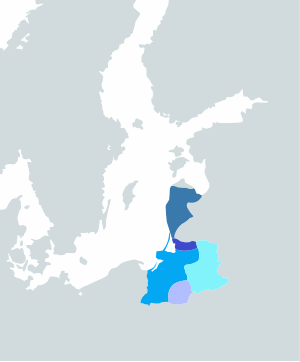West Baltic languages
| West Baltic | |
|---|---|
| Geographic distribution | In the northeast of Central Europe, western parts of Baltic region |
| Linguistic classification | Indo-European
|
| Subdivisions |
|
| ISO 639-5 | bat |
| Linguasphere | 54= |
 Former extent of West Baltic languages (including disputed ones) in 12th century Europe West Baltic languages Sudovian †
Skalvian † | |
The West Baltic languages are a group of
Attestation
The only properly attested West Baltic language of which texts are known is Old Prussian, although there are a few short remnants of Old Curonian and Sudovian in the form of isolated words and short phrases.[3]: 290 Many West Baltic languages went extinct in the 16th century while Old Prussian ceased to be spoken in the early 18th century.[4]
Classification
The only languages securely classified as West Baltic are Old Prussian and West Galindian, which could also be a dialect of Old Prussian.[5]
Most scholars consider Skalvian to be a West Baltic language or dialect.[2] Another possible classification is a transitional language between West and East Baltic.[6]: 16
Sudovian is either classified as an Old Prussian dialect,[7][8] a West Baltic language[9][10] or a transitional language between West and East Baltic.[11] The former two options would leave Sudovian in the West Baltic phylum.
Old Curonian is the least securely classified language. It is argued to be either West Baltic with significant East Baltic influence,[3]: 295 [12] or East Baltic.[13]
History
West Baltic was presumably native to the north of Central Europe, especially modern Poland, and the western Baltic region, which includes parts of modern Latvia and Lithuania. The West Baltic branch probably fully separated from East Baltic around the 4th–3rd century BCE, although their differences go as far as the middle of the last millennium BC.[6]: 13–14
Linguistic features
The West Baltic languages were more
References
- ^ Gimbutas, Marija (1963). The Balts. Ancient peoples and places. Vol. 33. London: Thames and Hudson.
- ^ ISBN 9785420013632.
- ^ ISBN 978-609-437-263-6.
- ISBN 978-03-6786-902-1.
- ^ Tarasov, Iliya (January 2017). "The Balts in the migration period". Istoričeskij Format Исторический Формат (in Russian). 3–4: 95–124.
- ^ ISBN 978-609-417-101-7.
- ^ Būga, Kazimieras (1922). Kalba ir senovė [Language and the Antiquity] (in Lithuanian). Vol. 1. Vilnius: Švietimo Ministerijos leidinys. pp. 78–83.
- ^ Gerullis, Georg (1921). "Zur Sprache der Sudauer-Jatwinger" [About the Language of the Sudovians-Yatwingians]. Festschrift Bezzenberger (in German). Göttingen: Vandenhoek & Ruprecht. pp. 44–51.
- ^ Mažiulis, Vytautas (1966). "Jotvingiai" [The Jatvingians]. Mokslas ir gyvenimas (in Lithuanian). 11. Vilnius: 32–33.
- ISBN 978-54-2000-102-8.
- ^ Otrębski, Jan Szczepan (1963). "Namen von zwei Jatwingerstämmen" [The names of two Yatwingian tribes]. Slawische Namenforschung, Vorträge auf der II. Arbeitskonferenz. Berlin: Akademie Verlag. pp. 204–209.
- ^ Mažiulis, Vytautas (1981). "Apie senovės vakarų baltus bei jų santykius su slavais, ilirais ir germanais". Iš lietuvių etnogenezės (in Lithuanian). Vilnius: Mokslas.
- ISBN 9789027230577.
- ^ Rytų ir vakarų baltai. Du baltų tarimų junginiai [East and West Balts. Two Compounds of Baltic Spelling] (in Lithuanian), Vilnius: Mokslo ir enciklopedijų leidybos institutas
- ^ Zinkevičius, Zigmas. "Lietuviai ir krikščionybė" [Lithuanians and Christianity] (in Lithuanian). XXI amžius. Archived from the original on 16 November 2012. Retrieved 7 August 2023.
